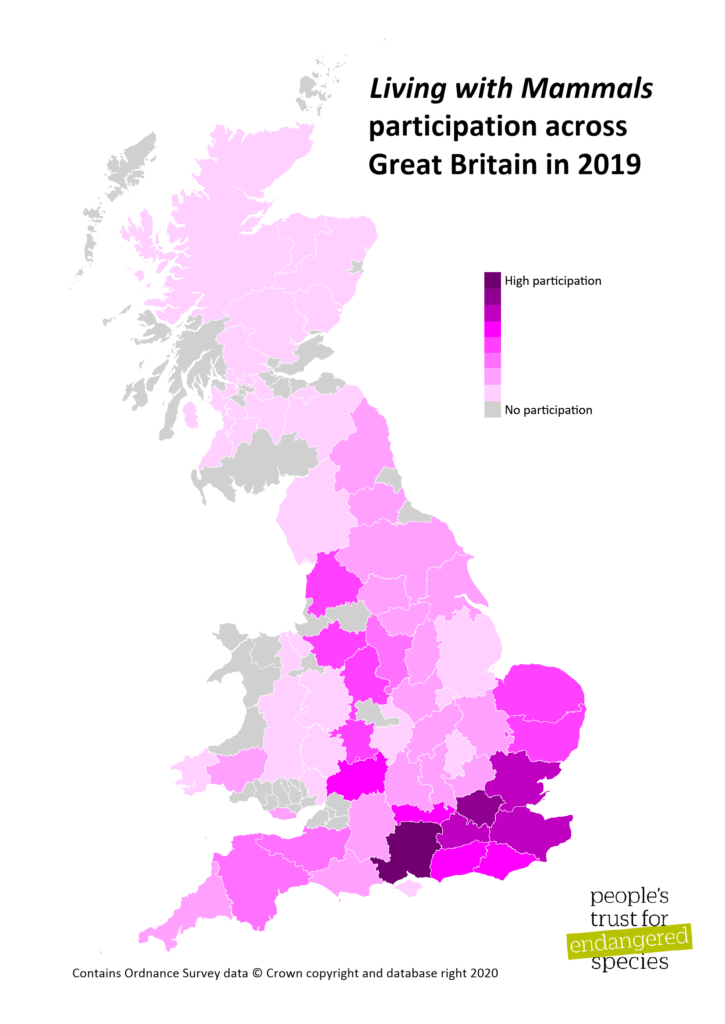Press release: Looking for wildlife during lockdown: Wildlife charity calls for volunteers to record mammal sightings in their gardens, aiding national conservation efforts
Although much of life has been placed on hold during the current lockdown, those who are now based at home can do something positive to help Britain’s wildlife, without having to leave their homes or gardens.
Many of Britain’s mammals are under threat, but recording sightings of these species can help conservationists protect their future. Wildlife charity People’s Trust for Endangered Species (PTES) is calling for volunteers to take part in its annual Living with Mammals survey, which starts today [30th March], asking for people in Scotland and northern England in particular, to help.
Volunteers across the country are needed to record sightings of wild mammals (or the signs they leave behind, such as footprints or droppings) they see in their gardens, or from their balconies or windows, to help conservationists understand how their numbers are changing. But while many species are found across the whole country, people are less evenly dispersed. Fewer people live in Scotland and northern England than in the southern regions, and participation in PTES’ Living with Mammals survey reflects this, as shown in the map below.

David Wembridge, Mammal Surveys Coordinator at PTES, explains: “Living with Mammals is something positive we can do at a difficult time and while we all stay in, we hope people will take the opportunity to appreciate their wild neighbours. People across the country are helping to build an extraordinary picture of how our wildlife is changing, but with fewer records in some areas, the picture is less clear. For a species like hedgehogs, that are still widespread but whose numbers have been going down, it’s as important to get as good an idea of how they’re doing in Scotland, say, as elsewhere, where we have more records.”
David continues: “And for species whose strongholds are in the north, these might be the majority of records we receive. Three-quarters of red squirrels, for example, and almost all pine martens, in Britain are found in Scotland. So, we’re keen to hear from anyone living there or in the north of England. Red squirrels are still present in a few parts of England, such as along the Formby Coast and around Newcastle, but elsewhere they are rarely seen.”
Living with Mammals starts today [30th March], and requires volunteers to record sightings of wild mammals, from hedgehogs and hares to roe deer and rabbits, that they see in their gardens. Volunteers are asked to spend a little time each week observing what they see in their garden, and to report their sightings online: www.ptes.org/LwM .
David continues: “Towns and cities are busy, noisy places, but it’s here that most of us live and encounter nature day-to-day. We know the importance of connecting to nature for our own health and wellbeing, and by monitoring wild mammals, it gives us an indication of the ‘green health’ of a town, city or village.”
The results of the survey to date offer a glimmer of hope for hedgehogs, whose numbers in urban areas and more widely, have been declining for at least 20 years. Recent data from Living with Mammals suggests hedgehog numbers may have picked up, but more records are still needed in order to find out exactly how each of Britain’s mammal species are faring.
Findings from this survey have contributed to national reports too such as the State of Britain’s Hedgehogs report, published in 2018 by PTES and the British Hedgehog Preservation Society, and the ONS’ Natural Capital report, published in 2019.
David concludes: “Surveys like Living with Mammals, which run annually, are the only way to tell if our conservation work is working, and where it’s needed. To date over 3,000 gardens across Britain have been surveyed by volunteers, which is fantastic, but we still need more records to help us understand, and encourage, the wild mammals on our doorstep.”
To take part in the 2020 survey (and find out how to identify different mammals, from pine martens to polecats) visit www.ptes.org/LwM, and if you’re on social media PTES would love to see your mammal photos using #LivingWithMammals.
– ENDS –
For further information, interview requests, or images please contact Adela Cragg:
T: 07532 685 614
Notes to Editors
Available for interview
• David Wembridge, Mammal Surveys Coordinator, PTES
• Jill Nelson, CEO, PTES
About PTES
- PTES, a UK conservation charity created in 1977, is ensuring a future for endangered species throughout the world. We protect some of our most threatened wildlife species and habitats, and provide practical conservation support through research, grant-aid, educational programmes, wildlife surveys, publications and public events.
- PTES’ current priority species and habitats include hazel dormice, hedgehogs, water voles, noble chafers, stag beetles, traditional orchards, native woodlands, wood pasture and parkland and hedgerows.
- PTES has Species Champions for three of its priority species: for hedgehogs The Rt Hon Chris Grayling, MP for Epsom & Ewell, for water voles The Rt Hon Hilary Benn, MP for Leeds Central and Chair of the Brexit Select Committee, and for dormice The Rt Hon Matt Hancock, MP for West Suffolk and Secretary of State for Health and Social Care.
- Visit www.ptes.org and follow PTES on Facebook, Twitter, Instagram, YouTube & LinkedIn.
